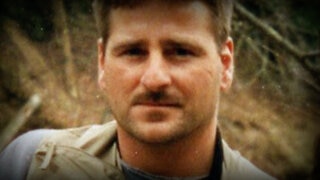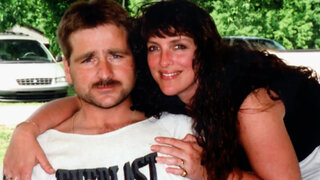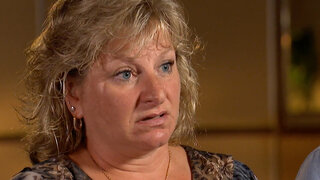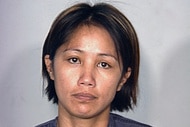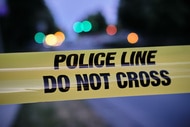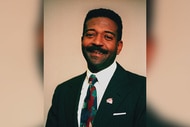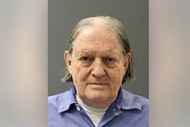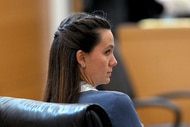Create a free profile to get unlimited access to exclusive videos, breaking news, sweepstakes, and more!
Did A Woman Really Confuse Her Husband For A Bear On Hunting Trip — Or Was It Murder?
“I saw the movement with my naked eye. But my scope magnifies it and I — and I looked. And it was a bear,” Mary Beth Harshbarger would tell Royal Canadian Mounted Police just hours after the fatal shooting in Canada.
When Mary Beth Harshbarger pulled the trigger on her rifle at dusk, did she really believe she was shooting at a bear? Or was it a more calculated shot by an experienced marksman to kill her husband, Mark, as his family believed?
Mark and Mary Beth Harshbarger had once appeared to be a couple deeply in love.
“He started a conversation with me a couple of times and he said, ‘Did you ever just look at somebody and know that they were the right person for you?’” Mark’s sister Sharon told “Dateline: Secrets Uncovered," airing Wednesdays at 8/7c on Oxygen.
The couple, who lived in rural eastern Pennsylvania, had a lot in common. Both were passionate and experienced hunters.
“She was very much for the outdoors too, for hunting and fishing,” Mark’s dad, Lee Harshbarger, told "Dateline" correspondent Keith Morrison. “She was very good with the rifle. She could shoot.”
Mark and Mary Beth both belonged to an exclusive 1,000-yard club, where they shot at targets 1,000 yards away and had a collection of precision rifles with what Lee described as “very good scopes.”
With the success of his job as a contractor, Mark was able to build the couple and their two young children a large cabin-style home in Pennsylvania and appeared to have achieved the epitome of success.
He even told his sister Susan, “If I die tomorrow, I’ve lived a good life.”
He didn’t know how foreboding that statement would turn out to be. Mark was shot to death in September 2006 during a family hunting trip to Newfoundland, Canada, with Mary Beth, the couple’s two children, and Mark’s brother Barry.
It had started as an idyllic trip. Mark shot a black bear and the group killed a few caribou.
“It was a beautiful country, a beautiful trip,” Barry said. “He was more than happy with life.”
But the trip turned tragic on the sixth day when the hunting guide dropped Barry off to hunt by himself on a rainy, foggy night just before dusk.
“It was an excellent time for game to come and move and feed, you know, with the early darkness,” Barry recalled.
Mark and the hunting guide went into the woods to try to scare up some game while Mary Beth waited with a rifle in the bed of a pickup truck, with her children safely packed into the truck’s cab.
Mary Beth would later say that she saw movement and thought she spotted a bear in her scope, when she fired from 60 meters away and shot Mark, who had just been emerging into the clearing.
The guide came upon the scene moments later.
“I said, ‘What did you shoot at?’” he later told investigators. “She said, ‘I shot at a bear. Did I get him?’”
“I said, ‘No, you got Mark,’” he said.
Mark had been struck in the chest and died instantly. As Mary Beth sobbed, the guide pulled her into the truck and they headed to pick up Barry, leaving the body where it lay.
“They come screaming and yelling,” Barry recalled. “Mary Beth was crying and I didn’t know what happened.”
Mary Beth insisted to the Royal Canadian Mounted Police that she thought she was shooting at a black bear not her husband.
“I saw the movement with my naked eye. But my scope magnifies it and I — and I looked. And it was a bear,” she said in an interview just hours later. “I think it was too dark to shoot.”
But the story didn’t sit right with most of Mark’s family.
“The fact that it was only 60 meters in an open area, I mean, right at, immediately we had that instinct that this wasn’t an accident. It just didn’t make any sense,” Mark’s sister Sharon said.
Mark’s older brother, Dean, who had briefly lived with the couple, described Mary Beth as being controlling and physically violent, sometimes slapping Mark “until his lips were bleeding.”
When Dean asked Mark if he was ever afraid Mary Beth would follow through on threats she had allegedly made and kill him, Mark told him, “Our love for each other is so strong, that she’d never do it, and if she did, she’d be losing the best thing that ever happened to her.”
Other family members described how Mary Beth had isolated Mark from his family. Mary Beth, who had been diagnosed with bipolar disorder, vacillated between temper tantrums and lavish spending sprees, they said. It got so bad about a year before Mark’s death that she had gone into a psychiatric facility at Mark’s suggestion — something his family believes she had never forgiven her husband for.
Just five months before his death, the couple had also increased his life insurance by $500,000.
The depiction of the marriage from Mark’s family was a stark contrast from the way Mary Beth herself had described the relationship.
“We had the perfect life, the perfect marriage, the perfect family,” she told investigators. “I loved him so much. He was my everything. I couldn’t wait for him to come home from work. That’s — that’s what I live for.”
The mounties, seemingly believing it was an accident, let Mary Beth return to her home in Pennsylvania. Barry tried to confront his grieving sister-in-law and began showing up more frequently to help take care of the kids. He eventually left his wife and moved in with Mary Beth as the two began a romantic relationship.
“My brother’s gone. It’s no longer his life,” Barry said when Morrison asked if he ever felt like he was trespassing on his brother’s life.
Barry believed his brother’s death had been an accident, but the rest of his family wasn’t so sure and Dean eventually called the Pennsylvania State Police to see if they would assist in the investigation.
The police did gather information for the RCMP — including evidence of a 1992 arrest for Mary Beth for assault — and passed it to the organization.
In 2008, two years after the shooting, Canadian authorities filed charges against Mary Beth for criminal negligence causing death. Prosecutors never contended that Mary Beth had shot her husband intentionally, but argued that she had been criminally responsible for pulling the trigger when it was too dark to shoot.
Mary Beth fought extradition for two years, but was eventually sent to Canada and the trial began in 2012.
The defense argued that on the night of the shooting Mark had “unknowingly exhibited the characteristics of a bear” by wearing dark clothing and slowly working his way down the hill.
The outcome of the trial was determined by a judge, who decided that Mary Beth was not criminally responsible.
“People cannot always act perfectly and even when people act reasonably, accidents unfortunately can occur,” the judge said.
Mary Beth was free to return home.
But life wasn’t exactly as she’d left it before. While she was incarcerated in Canada, Barry had run off with the babysitter and gotten married.
Mark’s family still believes they never received justice.

